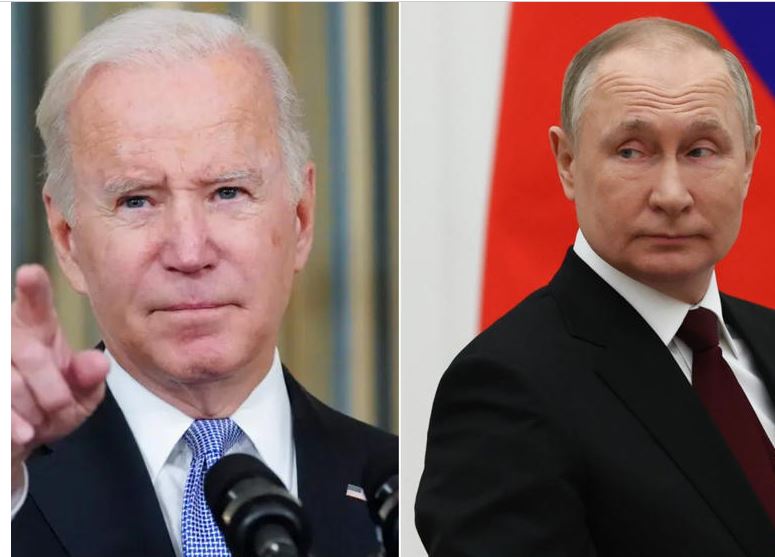
IBy the time Biden imposes sanction on Putin it will be too late.
I f you walk the streets of Moscow, you will eventually smell the faint odor of gasoline.
I am a former Moscow correspondent. Don’t let Vladimir Putin fool you: Russia’s war in Ukraine is only about one thing.
It’s as ever-present in the air around Russia’s capital as it is central to the country’s economy, infrastructure and geopolitical posture.
Russian President Vladimir Putin has spelled out a nationalist rationale for his country’s military incursion into two restive provinces in eastern Ukraine largely controlled by Kremlin-backed separatists, but it is primarily about protecting Moscow’s energy interests.
That was true in 2014, when Russia seized Crimea and I was a Moscow correspondent for the Wall Street Journal, for which I wrote dozens of stories about the insurgency in Donetsk and Luhansk that Russia helped foment. And it remains true now.
See: Putin calls for international recognition of Russia’s 2014 annexation of Crimean Peninsula in Ukraine
From the archives (March 2021): G-7 rebukes Russia over annexation of Crimea
To understand the Kremlin’s motivations in regard to its smaller, and relatively impoverished, neighbor, the key fact to know is that Russia supplies 40% of Europe’s heating-fuel supplies — namely, natural gas.
Any crimp on Russia’s ability to access the European market is a threat to its economic security.
To get it there, Russia relies mostly on two aging pipeline networks, one of which runs through Belarus and the other through Ukraine. For this, Russia pays Ukraine around $2 billion a year in transit fees.
Russia is a petrostate and relies on oil and natural-gas sales for about 60% of its export revenue and 40% of its total budget expenditures. Any crimp on Russia’s ability to access the European market is a threat to its economic security.
See: Chancellor Olaf Scholz suspends German certification of Nord Stream 2 gas pipeline from Russia
In the Kremlin’s view, a switch of allegiance by Kiev, or Kyiv by Ukrainian preference, to the West — be it an economic association agreement with the European Union like Ukraine was on the verge of signing in 2014, or even the hint of joining NATO — is close to an act of war.
In my three years covering Russia, I watched as the country slowly withdrew into itself after Putin returned to office for what was then his third term as president.
MarketWatch First Take (March 2012): Oil elixir losing its magic for Russia’s Putin
Gone were prior efforts to intertwine Russia’s economy and the global system and encourage foreign investment. As towering skyscrapers rose in Moscow atop a pile of oil cash, Putin’s government became more backward-looking and more isolated.
In Ukraine, meanwhile, many were growing increasingly ill at ease with the impoverished state of their country.
In Ukraine, meanwhile, many were growing increasingly ill at ease with the impoverished state of their country and highly corrupt political system as it languished, locked in a kind of Soviet-era limbo under Russian domination.
As Ukrainians looked to rising living standards in places like Poland and Latvia that had joined NATO and the European Union, many wondered why they couldn’t have the same for themselves.
This is where Putin’s nationalistic impulses kick in. He views the fall of the Soviet Union as the “greatest geopolitical tragedy” of the past century and the rush of former Eastern bloc countries into the embrace of the European Union, and even NATO, as a great humiliation.
He has drawn a line in the sand with countries that border Russia, invading Georgia in 2008 when it hinted at joining NATO, and moving to destabilize Ukraine when it moved to establish closer economic ties with Europe.
Domestically, Putin has sold the incursions into Ukraine on purely nationalistic grounds — even going so far this weekend as to dismiss Ukraine’s history as an independent country as a falsehood.
See: Biden targets Russian banks, sovereign debt in ‘first tranche’ of sanctions over Ukraine invasion
While Ukrainians and Russians share religions and ethnicities, they speak different, albeit similar, languages, even as there are pockets of native Russian speakers in some Ukrainian regions, as there are in other former Soviet republics. And while Russians have seen their quality of life improve awash in petro-rubles in the decades under Putin’s rule, Ukrainians have been mired in poverty and bogged down by misrule.
While it is no wonder many Ukrainians yearn to be unmoored from their bigger, imperialist neighbor, for Putin and his cohort of oligarchs Ukrainian self-determination is not really on the table.

 RSS Feed
RSS Feed
